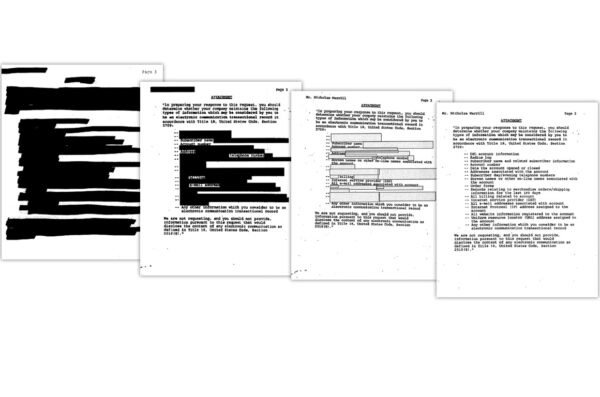Court Unseals More Documents on FBI's Use of Controversial "National Security Letters"
FOR IMMEDIATE RELEASE
Contact: media@aclu.org
ACLU Criticizes Claims of "National Security" Used to Censor Non-Sensitive Information
NEW YORK -- In the name of national security, the government sought to black out references in legal papers to the words "national security," the American Civil Liberties Union and New York Civil Liberties Union said today as it released dozens of documents that were heavily censored until now at the government's insistence.
"At every turn, the government has sought to censor even the most innocuous, non-sensitive information about this case," said ACLU Associate Legal Director Ann Beeson. "The use of 'national security' to suppress non-sensitive information deprives the public of basic information about government activity."
The documents were unsealed for the first time today because of a decision issued in September 2004 by Judge Victor Marrero of the Southern District of New York. The September decision struck down as unconstitutional a law that permitted the FBI to issue National Security Letters ("NSLs") -- letters that allow the FBI to obtain sensitive customer records from Internet Service Providers and other businesses without judicial oversight.
The NSL provision is worded so broadly, the ACLU said, that it could be used to obtain the names of a political organization's members, the names of a journalist's sources, or the names of people who write anonymous "blogs" on the Internet. The provision permitted the FBI to obtain this information without a subpoena or search warrant and without judicial oversight of any kind.
The September decision also struck down an associated gag provision, saying "an unlimited government warrant to conceal" has no place in our open society. The ruling was the first to strike down a surveillance provision of the Patriot Act. The court has not yet set a schedule for hearing the government's appeal of the ruling.
Throughout the case, the government has repeatedly sought to block disclosure of information about the government's use of NSLs and about the nature of the ACLU's legal challenge. The ACLU has created a special web page to display the types of information that the government has insisted on suppressing, including the documents unsealed today, at www.aclu.org/nsl. Some information about the lawsuit remains under seal.
In addition to references to national security, examples of the kinds of the information unsealed today include:
- Language requesting that the court permanently block the government from enforcing the NSL provision or from penalizing plaintiffs for failing to comply with it.
- Sections of a declaration by the recipient of the NSL about receiving the NSL and also mention of the NSL itself.
- Sections of a declaration by ACLU Executive Director Anthony D. Romero discussing the gag provision of the NSL and how it prevents the ACLU from informing the public that the FBI had used the NSL power.
- The fact that an NSL "is written on FBI letterhead."
The case at issue is Doe and ACLU v. Ashcroft et al., No. 04-CIV-2614. Attorneys in the lawsuit are Beeson, Jameel Jaffer, and Melissa Goodman of the ACLU and Arthur N. Eisenberg of the NYCLU.
The court's Sept. 29, 2004 ruling striking down the NSL provision is online at /Files/OpenFile.cfm?id=16595.


